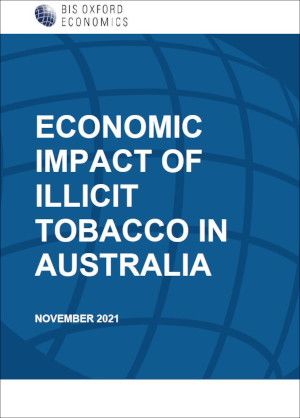Economic Impact | 14 Dec 2021
Economic impact of illicit tobacco in Australia

Economic Consulting Team
Oxford Economics


This report commissioned by British American Tobacco Australia, examines the size of the illicit market as well as the economic effects of that market on the national economy. Gains to illicit traders and the potential impact of issues such as money laundering are also discussed.
In total, we estimate around $4.9 billion in revenue was lost by the legal economy to the illicit economy by the illicit tobacco trade in 2019. Of the $4.9 billion lost to the legal economy in 2019, we estimate some $2.1 billion flowed to illicit operators.
About the team
Our economic consulting team are world leaders in quantitative economic analysis, working with clients around the globe and across sectors to build models, forecast markets and evaluate interventions using state-of-the art techniques. The lead consultant on this project was:

Andrew Tessler
Head of Economic Impact Consulting, Australasia, OE Australia
+61 (0) 2 8458 4224

Private: Andrew Tessler
Head of Economic Impact Consulting, Australasia, OE Australia
Sydney, Australia
Related Services

Post
The economic impact of abandoning the WTO
Oxford Economics have been commissioned by the International Chamber of Commerce (ICC) to provide an independent assessment of the economic impact of WTO dissolution. This report details our findings and the assumptions underpinning our analysis.
Find Out More
Post
The economic impact of the sports activities of public service media
This study shows how the sports activities of public service media supported €4.5 billion of GDP and 57,000 jobs across 31 European countries in 2022. The report also highlights wider economic benefits of public service media sports coverage, such as the way in which it leverages sponsorship income for sports bodies.
Find Out More
Post
Global Trade Education: The role of private philanthropy
Global trade can amplify economic development and poverty alleviation. Capable leaders are required to put in place enabling conditions for trade, but currently these skills are underprovided in developing countries. For philanthropists, investing in trade leadership talent through graduate-level scholarships is an opportunity to make meaningful contributions that can multiply and sustain global economic development.
Find Out More